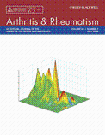Anti-DNA antibody induction of protein kinase C phosphorylation and fibronectin synthesis in human and murine lupus and the effect of mycophenolic acid
Abstract
Objective
To examine fibronectin (FN) expression in human lupus nephritis and the effect of anti-DNA antibodies on transforming growth factor β1 (TGFβ1) and FN synthesis in cultured human mesangial cells. The effects of mycophenolic acid (MPA) on this pathway, and the effects of mycophenolate mofetil (MMF) treatment in (NZB × NZW)F1/J mice were also studied.
Methods
Immunohistochemical analyses of renal biopsy samples from patients with active diffuse proliferative lupus nephritis were performed. Cultured human mesangial cells were incubated with human polyclonal anti-DNA antibodies, with or without MPA. (NZB × NZW)F1/J mice with active nephritis were randomized to receive either MMF (100 mg/kg/day) or vehicle treatment for 12 weeks.
Results
Glomerular FN expression was increased in patients with lupus nephritis, and it colocalized with IgG deposition. Anti-DNA antibodies induced protein kinase Cα (PKCα), PKCβI, and PKCβII activation, increased levels of bioactive TGFβ1, and increased FN synthesis in human mesangial cells (P < 0.001 for each comparison versus control conditions). Pretreatment of anti-DNA antibodies with exogenous DNA reduced their cellular binding and abrogated their induction of TGFβ1 and FN synthesis. Inhibition of PKC activation in human mesangial cells prior to anti-DNA antibody stimulation had no effect on cell proliferation, but resulted in significantly reduced antibody-mediated TGFβ1 secretion and FN synthesis. MPA treatment down-regulated PKCα, PKCβI, and PKCβII phosphorylation, reduced levels of TGFβ1 bioactivation, and decreased FN synthesis and deposition into the extracellular matrix. MMF treatment in (NZB × NZW)F1/J mice resulted in a reduction in glomerular IgG deposition, PKC activation, and FN expression, as well as an amelioration of proteinuria.
Conclusion
Human polyclonal anti-DNA antibodies induce TGFβ1 and FN synthesis in human mesangial cells through PKC activation, which is inhibited by MPA.




